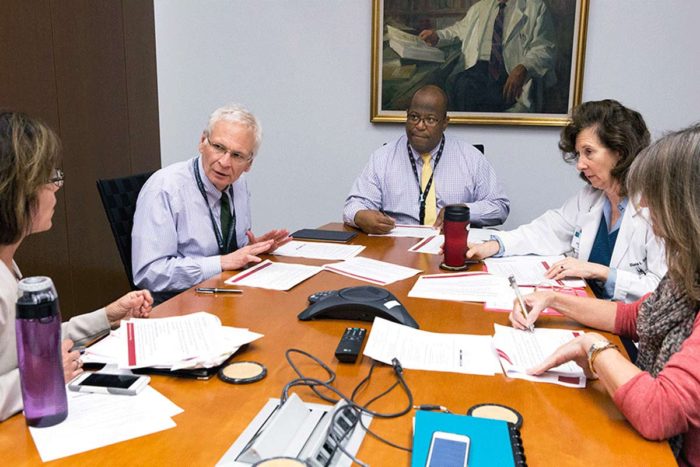Committee enhancing diversity, inclusion at medical school
New senior-level position, faculty hiring policy are among actions taken
 Michael Worful
Michael WorfulFrom left, Janice Renfro, Regis O'Keefe, MD, PhD, Daniel Blash, PhD, Diana Gray, MD, and Linda Reimann, meet to discuss the agenda for an upcoming meeting of the Senior Leadership Committee for Diversity and Inclusion at Washington University School of Medicine in St. Louis.
A leadership committee at Washington University School of Medicine in St. Louis is reporting progress in efforts to enhance diversity and inclusion in hiring, and in fostering a culture that values and respects differences in racial backgrounds, gender, religious beliefs, physical abilities, sexual orientation and individual perspectives.
“We want people on our campus to know that steps are being taken to build a community in which everyone is welcomed, respected and supported, and we are deeply committed to these issues,” said Regis O’Keefe, MD, PhD, the Fred C. Reynolds Professor and head of the Department of Orthopaedic Surgery. “By understanding and embracing our similarities and differences, we enrich and strengthen all that we can accomplish together.”
Work has been underway for the past two years, after the Senior Leadership Committee for Diversity and Inclusion and five subcommittees were formed in 2015 at a School of Medicine Leadership retreat aimed at improving diversity and inclusion at the school. O’Keefe and Diana Gray, MD, associate dean for faculty affairs, are co-chairs of the leadership committee.
The subcommittees are focused on faculty hiring, staff hiring, campus climate, professional training and curriculum design.
To date, the faculty hiring, staff hiring and campus climate subcommittees have implemented action plans to enhance diversity and inclusion. The plans were approved by the leadership committee and the Executive Faculty.
“The Senior Leadership Committee for Diversity and Inclusion’s mission is to oversee deliberate, wide-reaching actions that will create a framework for meaningful change,” said Gray, also a professor of obstetrics and gynecology and of radiology. “Many of the subcommittees’ recommendations already have been implemented, and others currently are in the works.”
For example, the leadership committee created a new senior-level position — associate vice chancellor for medical campus diversity and inclusion. This person, who will report to the dean of the School of Medicine, will coordinate and direct diversity initiatives at the school and research steps that peer institutions are taking. A search committee has been formed to fill this position. Leadership committee members Sarah England, PhD, the Alan A. and Edith L. Wolff Professor of Medicine in Obstetrics and Gynecology, and Timothy Eberlein, MD, the Spencer T. and Ann W. Olin Distinguished Professor and head of the Department of Surgery, are the search committee’s co-chairs.
A leadership committee task force also has created a new schoolwide faculty hiring policy and contributed to the development of a website through which all applicants must apply. The website tracks demographics and application outcomes. All faculty search committees now must include a designated diversity adviser, who will monitor and report on the applicant pool and interviewees. Several specially trained faculty members and employees in human resources are available to serve in this role. The policy was approved by the Executive Faculty in February 2016.
Daniel Blash, PhD, assistant dean of cultural awareness and staff diversity at the School of Medicine, said senior-level involvement is a key factor in a successful diversity and inclusion effort. “I am proud of the steps our leaders have taken to ensure both accountability and sustainability, and I am encouraged by their investment of time, energy and resources,” he said.
Forty-two percent of faculty and 71 percent of staff have participated in the first of four diversity and inclusion training sessions offered by the Human Resources Office of Diversity and Inclusion. The curriculum is designed to improve awareness and understanding. As a result of the leadership committee’s work, sessions 1.0 and 2.0 of the curriculum now are part of new-employee orientation. Also, a goal has been set for new employees to complete all levels of training by the fourth year of employment. For current employees, the Office of Diversity and Inclusion offers open sessions for all levels of training. The frequency of these sessions is intended to encourage all current employees to complete all levels of training by 2020.
“Diversity and inclusion are core values of the School of Medicine,” Gray said. “In recent years, several factors have demonstrated that we have work to do. These new changes are aimed at improving the climate and culture on our campus, and we are passionate about continuing to improve.”






